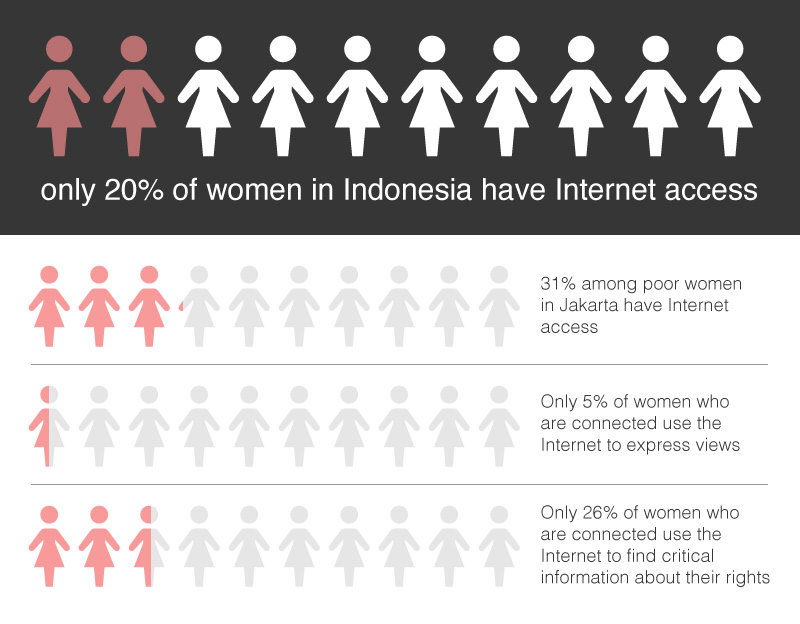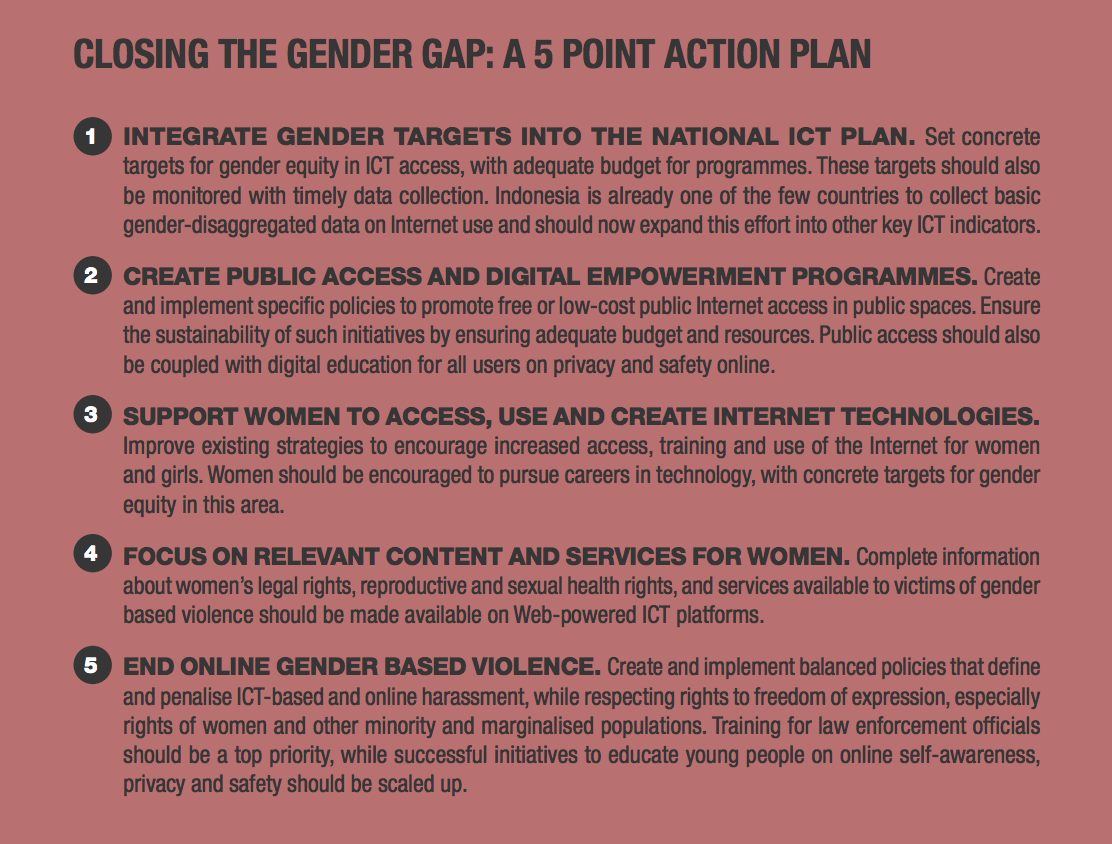This is a guest post from the Web Foundation’s Ingrid Brudvig, Lead Researcher of the Women’s Rights Online report.
In October 2015, the Web Foundation’s Women’s Rights Online network launched a global report based on a year-long household survey research project in ten cities, including Jakarta, focused on poor urban communities. The global findings show that, overall, while a majority of the women we surveyed personally own a mobile phone, women are still 50% less likely than men to use the Internet and 30-50% less likely to speak out or seek economic opportunities online – even when controlling for other important variables such as age, income and education.

These global trends were largely reflected in our findings in Jakarta too. According to the International Telecommunications Union (ITU), only 20% of women in Indonesia have Internet access. According to our study, this figure increases to 31% among poor women in Jakarta, significantly less than the 50% of men in the same communities who are connected. What is more, few of the women who are connected use the Internet to express views (5%) or find critical information about their rights (26 %).
The government is taking action to enhance connectivity. The National Broadband Development Plan was established through Presidential Decree number 96 of 2014, and includes extending broadband infrastructure, along with improving ICT services in non-commercial areas, spectrum management, ICT literacy, and expanding e-government initiatives. However, none of the ICT policies, nor the National Broadband Plan, make specific reference to gender or the promotion of women’s access to the Internet and ICTs. This is a cause for concern.
Under national law – women, like all citizens – should also enjoy freedom of access to information. The Indonesian Constitution guarantees every person “the right to communicate and to obtain information for the purpose of the development of his/her self and social environment” and “to seek, obtain, possess, store, process and convey information by employing all available types of channels” (Article 28F). This Constitutional protection is supported by the Law of the Republic of Indonesia number 14 of 2008 on Freedom of Information, which came into force two years later on 1 May 2010. The Act provides a legal guarantee for access to information held by public bodies, and requires public bodies to proactively publish information as well as to release information upon request.
The Internet is a vital tool for everyone to seek and access information, connect with communities, innovate and solve problems, and to participate in civic life. At the Web Foundation’s Open Data Lab in Jakarta, we believe that government data which is open and freely accessible online gives people the power of information, supporting citizens to participate in a democratic life and hold governments accountable. But gender inequality in Internet access and use is a roadblock to women’s participation as active citizens in both the digital and data realms.
What we’re doing to change this
The Sustainable Development Goals commit Indonesia to achieve:
- 4: equal access to basic services [and] appropriate new technology for all women and men by 2030
- SDG 5b: women’s empowerment through technology;
- SDG 9c: universal, affordable Internet access in least developed countries by 2020;
- SDG 17: significantly increase the availability of high-quality, timely, and reliable gender-disaggregated data.

Over the past year, we’ve been working with partners in the Women’s Rights Online network (including ICT Watch in Indonesia) to build national Five Point Action Plans for achieving the Sustainable Development Goals on women and technology.
Our Action Plans include country-specific recommendations to turn political commitments into concrete interventions, focusing on priority issues such as affordability, digital skills and education, and online civic participation. Priorities were identified by our partners based on Women’s Rights Online research findings and on further consultation with country stakeholders, including government officials, community groups, and women in the communities surveyed for our study.
Our research findings show that women’s exclusion from the digital revolution is primarily due to policy failure, which can be reversed by getting governments to REACT and focus on Rights, Education, Access, Content, Targets. Rapid progress is possible in all countries through simple steps like reducing the cost to connect, introducing digital literacy in schools, and expanding public access facilities. The Women’s Rights Online Report Cards set out five context-specific steps that each country can take in the next year to work toward closing the digital gender gap.
In Indonesia, these priorities are:
- Integrate Gender Targets into the National ICT Plan.
- Create Public Access and Digital Empowerment Programmes
- Support Women to Access, Use and Create Internet Technologies
- Focus on Relevant Content and Services for Women
- End Online Gender Based Violence

To help ensure that there is sustained pressure for implementation of these Action Plans and SDG commitments, we also recently developed a Digital Gender Gap Audit Scorecard with support from UN Women. This Scorecard aims to fill the evidence gap by bringing together 14 simple indicators for which reliable empirical evidence exists . Looked at collectively, these indicators can be used to measure country progress towards closing the digital gender divide.
What’s your vision?
What’s your vision of Indonesia’s digital future and the power of women and girls in creating it? We can’t wait to hear it! Join us on November 25th at the “Who participates? Who benefits? A Forum on Women and Their Rights Online”, to discuss women’s online access, rights and participation in Indonesia. There, we will present the results of Indonesia’s Digital Gender Gap Audit, and share details about our 5 Point Action Plan to halt and reverse growing digital inequality. The forum will take place from 8:30 to 11:30, at the Sequis Centre Auditorium in Jakarta and is co-hosted by ICT Watch and organised with the support of Making All Voices Count and Ford Foundation.
* Did you know? November 25th is the International Day for the Elimination of Violence against Women. It is also the first day of the global 16 Days of Activism campaign on Ending Violence Against Women
If you’re interested in this event and you’d like to know more about the Jakarta Lab and our projects, visit the Lab’s website. You can also follow us on Twitter @ODLabJkt and regularly check our blog to get the latest updates from us.
Further Reading
To learn more about Women’s Rights Online, you can read the global report, the Report Card Global Trends Overview, which is available in both English and Bahasa Indonesia, and the WRO Indonesia Report Card, also downloadable in Bahasa Indonesia. Learn more about the involvement of our co-organiser, ICT Watch, by reading their blog on the project. We hope to see you at the event!
Leave a Reply